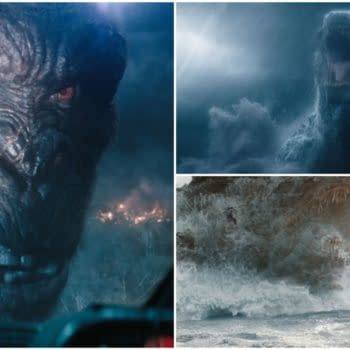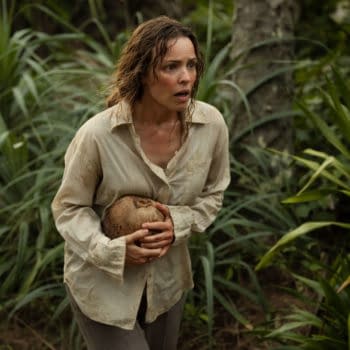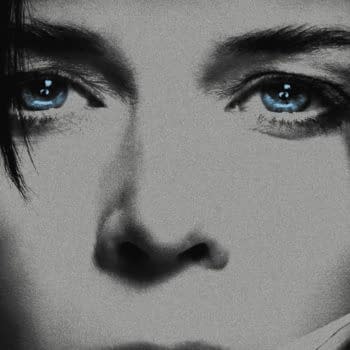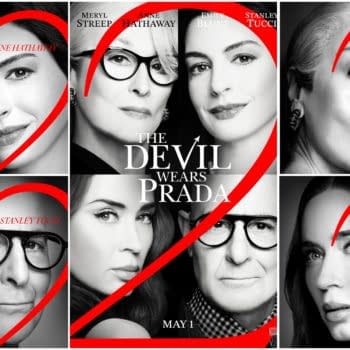Posted in: Movies | Tagged: Adam Marcus, Curtis Fortier, Development Hell, entertainment, film, Sam Hamm, Watchmen
I've Stepped Into Development Hell With Sam Hamm's Watchmen
In an era where it seems like every other film is based on a comic, it might be hard to remember a time when it was more likely for an adaptation to never reach the screen than to be a success. There are a plethora of amazing… and some not so amazing… scripts out there that got lost along the way. That's where Development Hell comes in and I got a chance to talk with Adam Marcus and Curtis Fortier about their upcoming performance of Watchmen from a script written by Sam Hamm in 1989. Marcus is a horror movie icon having directed Jason Goes to Hell: The Final Friday, Let It Snow and was co-writer of Texas Chainsaw Massacre 3D. Fortier is a former student of the world renown Groundlings and a internationally touring stand-up comedian.
And as the title of the article might giveaway, I'm going to be part of the cast for the upcoming performance on April 29th at the Comic Bug in Manhattan Beach, CA.

AM: Development Hell was created by Mike Wellman at The Comic Bug to be a chance for remarkable unproduced Comic Book scripts to be seen by the public. It's a presentation of fan favorite material to be read by fans for fans. That's really why we're doing it and why we're excited about it.
CF: It got started as an idea by Mike and our first one was the unproduced Indiana Jones IV film called Indiana Jones and City of Gods. It was an incredibly small cast and people had to play multiple parts sometimes on the fly. I ended up playing a German, a Brit and a Russian — sometimes all on the same page. It was a lot of fun. Mike knew I was an actor and afterward asked me if I would kind of head up the next one. I enthusiastically agreed.
AM: This is the fifth iteration of Development Hell and the fourth one I've been involved with. For the last four scripts, (" Joss Whedon's Wonder Woman", " George Miller's Justice League", "Ben Ramsey and John Singleton's Luke Cage" and now "Sam Hamm and Terry Gilliam's Watchmen") I've read the stage direction (aka all the stuff that isn't dialogue) and for the last three, I've been directing the actors. With this reading my production company, Skeleton Crew, which is co-founded by my brilliant writing partner and wife, Debra Sullivan (who is one of our readers) and my genius producing partner Bryan S. Sexton, we have partnered with The Comic Bug and with Curtis' company Cattywampus to start producing Development Hell to make it an even bigger and more immersive experience for the audience.
DW: With this new performance, you're taking on the much beloved Watchmen from a script written in 1989. Who did the screenplay your working from, why didn't it get made and how does it differ from the one that Zack Snyder eventually got to do?
CF: The Watchmen script we are reading was written by Sam Hamm and was to be directed by Terry Gilliam.' I'm sure we'll never know the full story as to why it wasn't made. There are many differences from the Zack Snyder film and also from the graphic novel. One large one is that Sally Jupiter, Silk Spectre's mother, is not in the script. The Minutemen are also kept to a minimum. These are just two differences, but for now, those are all that I will mention. To see any more differences, people will just have to come and see the reading April 29th at 7:00pm at The Comic Bug in Manhattan Beach, CA.
AM: Sam Hamm's script is really terrific. And, much like his version of Batman it pays tribute to the source material but it doesn't follow it dogmatically. I think the biggest problem with the development on this one was that Gilliam didn't think the film could be produced effectively enough with the tech available in the early 90s. But, man I wish he had gotten to make this film. I mean, this story should have been told by the guy who made Brazil and Time Bandits. From a visual and political viewpoint can you imagine a better storyteller than Gilliam for this tale?
DW: Adam, you are the director of the performance. How do you approach putting on a performance like this? How much time and effort does it take? And how would this compare to when they used to produce radio dramas?
CF: I'm going to let Adam take this questions. Adam has been directing and writing film all his life. He is an icon in the horror movie genre having directed the acclaimed Jason Goes to Hell: The Final Friday in 1993. He has also directed many other genres of film so we're lucky to have him aboard to elevate the project to be more than just a bunch of fanboys reading a script. This is full cast with rehearsed and directed actors taking on this material.
AM: Directing the performance starts as all directing does… CASTING! You get the right cast, you end up having very little to do when it comes to shaping performances. But that's really what it's about. Getting the choices right so the performer can really craft something terrific. I am very lucky in that my production company, Skeleton Crew, has a group of actors that I've been cultivating for two decades. Most of the readers will come from that troupe of remarkable performers. We have a very tight shorthand with each other. So I can say a couple of words or phrases and my team knows just what I'm looking for. We can usually get the performance down in one rehearsal and some one-on-one meetings to nail stuff down. However, the most important ingredient I can help to add to the mix is conflict. It's what all drama lives on and it's what turns a reading into an experience. As far as how this compares with radio dramas… actually it is exactly like an old radio drama. The tech might have changed but when you're doing something live, it's no different than what people listened to in the early days of radio drama.
DW: Curtis, you got the role of roles here with Rorschach. How do you wrap your mind around playing a character like that? Do you look to the source material, just what's on the scripted page or does the performance by Jackie Earl Haley influence your choices?
AM: I'll let Curtis tackle this one.
CF: Getting to play Rorschach is certainly a treat for me. I wrap my mind around playing a character like that by finding his sense of humor. I spent a decade on the road as a stand-up and I write, produce and act in comedy web-series so I naturally gravitate toward a character's sense of humor. And for a character like Rorschach, it helps the audience get a better insight into him if they learn what he finds humorous. They might even be able to identify with him on some level if they can see what makes him laugh. And knowing what makes a character laugh can make them more menacing in an audience's eyes. Look for some dark…dark…humor to come out of Rorschach at this reading.
DW: Each member of the cast plays multiple roles. Usually a major role and some minor ones. How do you decide who is going to play what role and how do you determine how many actors you need?
CF: I start with the major roles and cast who I think would be best for each of them. From there I try and pass out other minor characters depending on where they appear in the script. It's best not to have an actor reading multiple roles on a page. It only takes a second to "switch characters" but that second is a big enough pause to slow down the pace and the fun. I want actors interacting with other actors, not just themselves. Sometimes it's unavoidable (like me in the Indy reading) but I try and keep it to a minimum. And sometimes, I just need to cast a person or two and just give them noting but smaller roles. This is cool too as it gives an actor multiple roles to play and multiple "masks" to wear during the performance. You never know what they're going to do next.
AM: Here's the thing, if you have great performers, they can do multiple things in one reading. For example, anyone who's even heard Jim Dale's readings of The Harry Potter books knows exactly what I'm talking about. Actors are remarkable artists and for me there is no better way to see that artistry than doing this kind of work. I love to see one performer have to create on the spot, 3, 4 even 5 different characters. it's like acting athletics. When casting, you try to play to people's strengths. What kind of voices fit what kinds of roles. But the best part is when you see something like this read live, someone who looks NOTHING like the character they're playing can be the perfect voice for that character. The prince can play the evil frog and the frog is the most handsome, romantic prince you ever heard. It's kind of magical actually.
DW: The performance is open to the public. What details can you give about the night and what can attendees expect to see?
AM: People should expect to have an experience they might not be used to but will fall in love with. This is like a book on tape come to life. Like your favorite Podcast happening before your eyes. I know, it sounds weird but it's like going back almost a century to experience what live radio-drama was like. Chris Saunders creates this amazing soundtrack for the whole event along with explosions and a whole host of sound effects. Audiences should also expect to see what could have been. This is a great story as told by a great storyteller. It's in love with the source material without being chained to it. The public should also expect free stuff. Not just the reading but a stunning poster by artist Bryce Doerksen. But best of all, free popcorn. I mean, seriously, does it get any better than that?
CF: The performance is open to the public, but it is Watchmen so there is non G-rated language throughout. There is no charge to watch and audience members can even bring your own beverages whether they be soda, non-alcoholic or even alcoholic. Mike Wellman and the staff of the The Comic Bug will have their popcorn machine working overtime so there will be free popcorn. People can also bring food and snacks. The reading is cast with talented, working professional actors and Chris Saunders of The Thirsty Crows will have a full soundtrack and sound effects going throughout the performance. And That Hashtag Show will be filming the event and doing interviews. The audience can expect to see a Watchmen unlike anything they have ever see as the majority of it will happen in their imagination.
Here is the full cast of the production:
Adam Marcus — director of Jason Goes to Hell: The Final Friday, co-writer Texas Chainsaw: 3D, director of "Let it Snow"
Curtis Fortier — Groundlings, 5th Passenger, www.12SidedDie.com, www.hollowship.com, internationally touring stand-up comedian,
Chris Edgerly — v/o artist: Star Wars: The Clone Wars, Transformers, The Simpsons
Debra Sullivan — TV/Film actress including Criminal Minds, Cold Case, Big Love, Private Practice,
Tracy Drolet — TV/Film actress, will be appearing on the Investigation Discovery channel
Rafael Navarro — Comic book artist
Elester Latham — TV/Film actor
Chrisotpher Cho — Mighty Morphin' Power Rangers, Beetle Borgs
Dan Wickline — Comic writer, novelist and Corpse on Dexter
Will Dixon — TV/Film actor appearing on Scandal, Las Vegas, Charmed
Nathan Hedrick — TV/Film actor/stuntman
Chris Saunders (music and sfx) — The Thirsty Crows band
Mike Wellman (Executive Producer) — owner of the Comic Bug/The Great Bird of the Galaxy
Original art in the article by Dave Gibbons.















